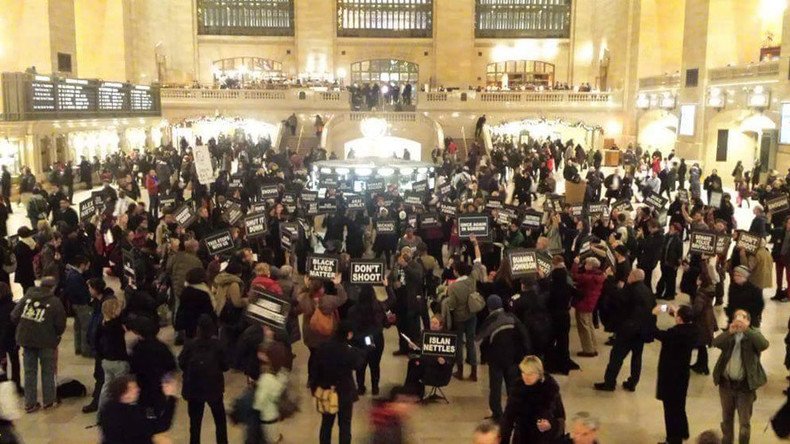NYPD used undercover police to snoop on Black Lives Matter protests - court documents

Newly obtained documents indicate the New York Police Department may have committed constitutional violations by deploying undercover officers to monitor peaceful Black Lives Matter protests, following the death of Eric Garner in 2014.
It also collected multimedia recordings from Grand Central Station demonstrations according to court documents filed by the NYPD in response to a lawsuit, The Guardian reported.
The disclosures were made after a group of New York attorneys filed a suit against the NYPD after they refused requests to release records under the freedom of information law.
The NYPD asserted they absolutely did not have undercovers at the protests & still refused to release records. https://t.co/lLCMlvlEV9pic.twitter.com/sHAH0u7BXO
— Keegan Stephan (@KeeganNYC) September 29, 2016
Writing in response to the FOI request, the NYPD wrote in a court filing last month that it found several records regarding its undercover operations of Black Lives Matter protests at Grand Central Station following Garner’s death. The department wrote it had discovered multimedia records as well as communications that occurred between a plainclothes cop and their handlers in which they discussed the protests while they happened, The Guardian reported.
We sued, and the NYPD was forced to admit it lied, and definitely had undercovers at the BLM demos. https://t.co/4S2HiBSeQXpic.twitter.com/vAvBbt0EzT
— Keegan Stephan (@KeeganNYC) September 29, 2016
While the third requested file “consists of a single record, which is a communication from an NYPD officer working in an undercover capacity and his base,” also connected to the protests.
Mass protests erupted at Grand Central Station in December 2014 after a grand jury decided not to indict Daniel Pantaleo, a police officer involved in the death of Eric Garner in July of that year.
The choking to death of Garner was caught on video and ruled a homicide by the city medical examiner, but the grand jury decided not to indict Pantaleo on any charges.
READ MORE: Dozens arrested as NYC protests Eric Garner decision
Keegan Stephen, one of the activists involved in the FOI suit, said that the NYPD first claimed they could not locate any records and later argued that all of its records were exempt and refused to disclose them. The group, made up of activists and attorneys, then filed a suit and the latest revelations were made in response to that.
Check out this "protester" at #PeoplesMonday shaking hands with Sgt. Arthur Smarsch: https://t.co/sDnR3R5Bgvpic.twitter.com/FH4ZWKjPlw
— Keegan Stephan (@KeeganNYC) September 2, 2016
The same records request led to the release of nearly 300 documents in 2015 by the Metropolitan Transit Authority and the Metro-North Railroad which revealed that undercover police have regularly spied on BLM protestors as reported by The Intercept.
The attorneys involved say this insight into NYPD’s activities could reveal potential constitutional violations, considering the MTA and Metro-North police observations of the protests described the gatherings as “peaceful” and “orderly.”
“The fear and disarming effect caused by undercovers being assigned to what were and continue to be extraordinarily peaceful protests is disturbing,” MJ Williams, one of the attorneys involved in the records request told The Guardian.
“To the extent that it would influence individuals not to participate and get individuals to censor what they say because of a fear of undercovers – that’s a basis for a first amendment violation.”
Williams also added there was a potential fourth amendment violation for unlawful seizure if police held files on protesters that could be used against them because of their political activities.
However she admitted that law enforcement agencies “have all sorts of justifications for data collection for public safety that the courts have allowed.”
The police could also be in violation of the Handschu agreement if they are found to be collecting images of protestors for the sole purpose of monitoring their political activity.
Oral arguments in the case are scheduled to be heard on December 7th.
This is not the first time the NYPD have been accused of violating court-decreed rules on conducting investigations of political activity, minority groups or individuals.
During the Occupy Wall Street Movement it was reported that undercover cops were deployed to get close to protestors and infiltrate the social movement.
A report released in August by New York City’s independent police monitor noted that between 2010 and 2015 the NYPD also violated laws in their surveillance of Muslim communities.
In 2003, a judge overseeing the Handschu agreement censured the NYPD following revelations that officers had been using a document called the Demonstration Debriefing Form when interrogating anti-Iraq War protesters, the New York Times reported. The form tracked where the protesters went to school, what organizations they belonged to and what demonstrations they had previously participated in. Detectives also reportedly asked protesters about their political beliefs, including their views on Israel and Palestine.












